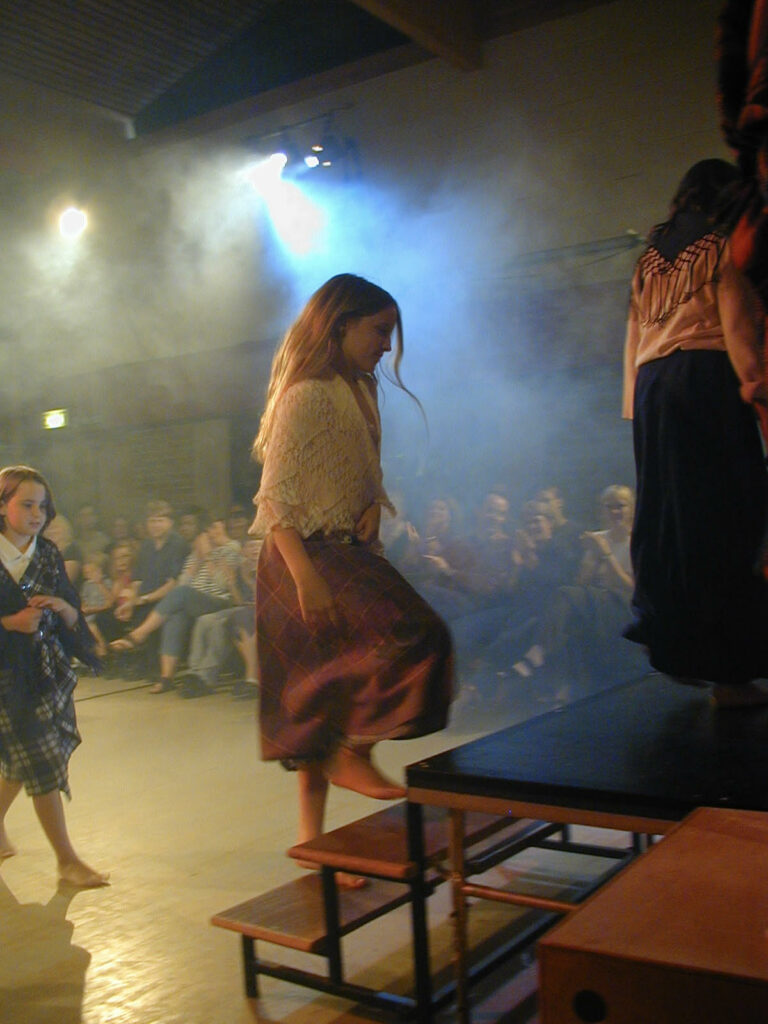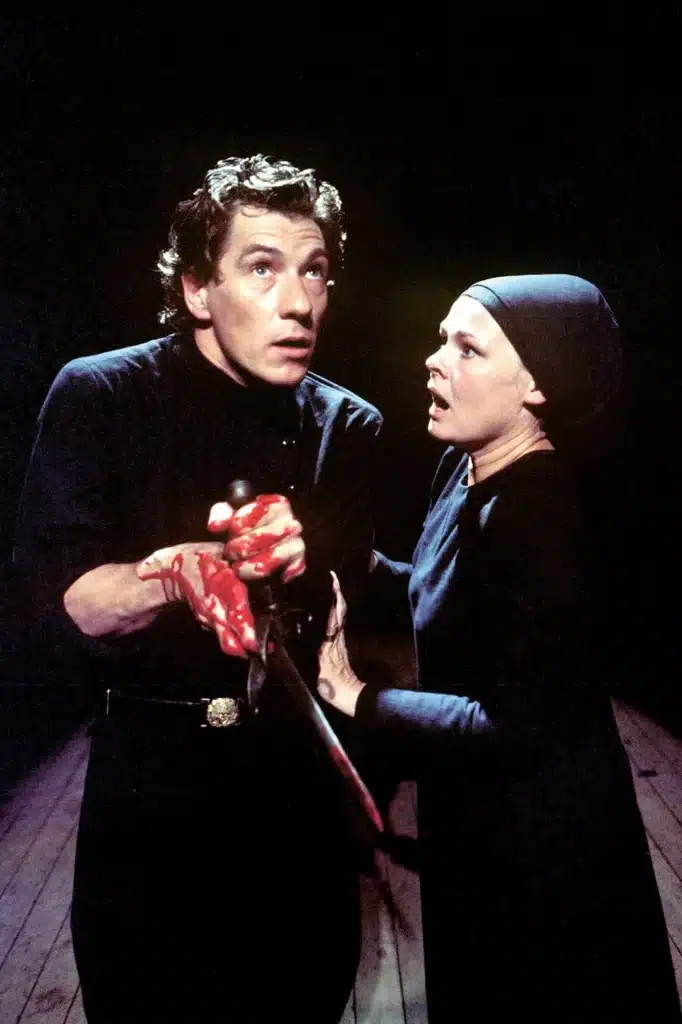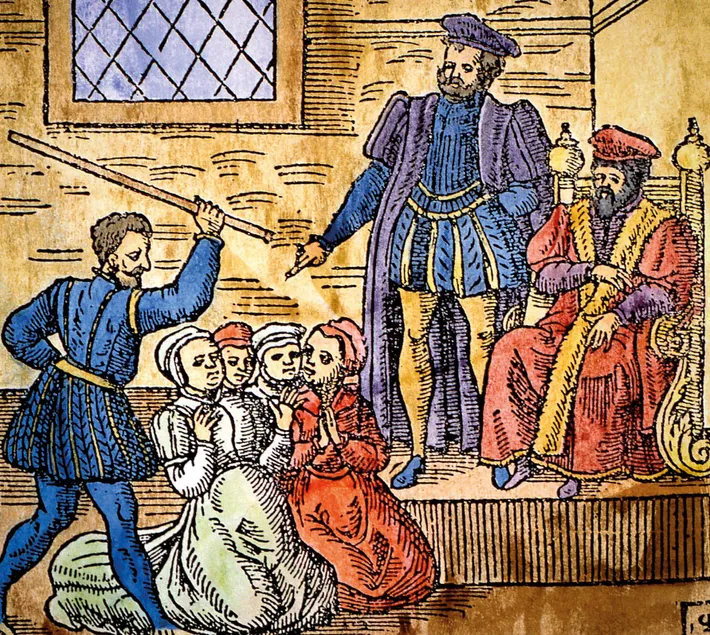Macbeth is one of Shakespeare’s best known plays and its popularity has stood the test of time. Its enduring fame comes down to the play’s supernatural legacy; its rich, captivating dialogue; and the maniacal character arcs of Macbeth and Lady Macbeth.
English Touring Theatre (ETT) are bringing their bold new production of Macbeth to the Connaught in March, so we took a deep-dive into this twisted tragedy – to find out more about why Macbeth remains one of Shakespeare’s best loved tragedies, and how it got its ‘cursed’ reputation.
About 'Macbeth'
“Things bad begun make strong themselves by ill.”
Macbeth was recently voted Shakespeare’s second best play – just behind Hamlet in the top spot. Its plot deals with the toxic, psychological effects of greed through the rise and fall of the respected, but power hungry war hero, Macbeth, and his wife. The play presents the pursuit of power as (quite literally) cut-throat and it examines how a lethal mix of dishonesty and ambition can unravel relationships, and corrupt even the most revered of people.
It is believed that Shakespeare wrote Macbeth in 1606, about a year after Guy Fawkes and the Gunpowder Plot was thwarted by King James 1st. King James, also known as James 6th of Scotland, was fascinated with the supernatural world, especially witchcraft, and how it related to morality and virtue.
Macbeth is seen as Shakespeare’s tribute to his relationship with the King, through his use of witches, prophecies, and many of the play’s characters being based on real Scottish historical figures.
Shakespeare places Macbeth’s depravity in direct opposition to the brave moral convictions of Banquo, whose son will inherit the throne; therefore positioning King James as the successor to a heroic and morally superior lineage.
Why is 'Macbeth' so popular?
“I have bought
Golden opinions from all sorts of people.”

Macbeth’s popularity may be due to its universal appeal. It follows a recognisable story of greed, betrayal and guilt that transcends time, place, and sociopolitical contexts. In his wake, Macbeth leaves a trail of bodies to cover up treachery after bloody treachery, giving him a unique role in Shakespeare’s work as both hero and villain.
The relationship between Macbeth and Lady Macbeth is an intriguing watch for audiences, who see this apparently devoted couple descend into madness and abuse. It is hard to look away from the inevitable doom of such domineering characters.
Another potential factor to Macbeth’s popularity is that it is often used in schools to introduce children to Shakespeare’s tragedies. It is one of Shakespeare’s shorter plays, and its themes are straightforward and easy to comprehend, which suits younger audiences. The play’s dark plot is absorbing and engaging for audiences of all ages who may be experiencing Shakespeare for the first time.
WTM’s Press Officer, Idgie, visited the Pavilion Theatre with her primary school to see a production of Macbeth by touring company, Shakespeare 4 Kidz, in 2000. She says:
“Being introduced to theatre and Shakespeare as a child inspired me to follow a career in the arts. I have an MA in Text and Performance from RADA and I have used my own creative practice to work in community engagement for several arts charities. Seeing Macbeth at the Pavilion was one of many formative experiences of the theatre that led me down this path – it’s led me right back to the Pavilion, in fact, as it’s now my office!”

Why is 'The Scottish Play' unlucky?
“By the pricking of my thumbs,
Something wicked this way comes.”
Macbeth’s reputation as a cursed play began almost immediately. It is thought that Macbeth became cursed by a real coven of witches, who were furious that Shakespeare had used actual incantations for the Weird Sisters’ prophecies.
The curse, according to theatrical superstition, is that speaking the name of the play inside a theatre, other than when called for in the script, will cause a disaster. Theatre professionals choose to call Macbeth by other names, such as ‘The Scottish Play’, and have various rituals for undoing the curse should it be evoked — usually involving spitting! It is also thought that Macbeth’s popularity plays into its reputation as an unlucky show, where a company will mount a production of Macbeth when facing financial difficulties, knowing it will find an audience.

Falls off and on stage, injuries, accidents with props, technical failures, and financial trouble are common in the theatre. However, several notable productions of Macbeth have been marred by more extreme mishaps, such as theatres burning down, and even deaths, which has strengthened the play’s supernatural reputation.
Of course, the curse’s very existence means people may be more inclined to notice when an accident occurs in a production of Macbeth versus in any other play! Yet, it seems that the curse prevails: many noticed that Chris Rock spoke the name of the play at the 2022 Oscars, when he mentioned Denzel Washington’s performance in The Tragedy of Macbeth, shortly before receiving an unexpected slap to the face from Will Smith.
'Macbeth' Now
“All hail Macbeth, that shalt be King hereafter”

Despite its uncanny reputation, playing the roles of Macbeth and Lady Macbeth is still a career goal for many actors, thanks to the characters’ complex power dynamics and the poetic text. Modern iterations of the play lend themselves well to exploring urgent socio-political themes.
Macbeth has had many adaptations over the centuries. Two of the stand-out stage productions both originated in Shakespeare’s birth-place, Stratford-upon-Avon, home of the Royal Shakespeare Company. In 1955, John Gielgud directed Laurence Olivier and his real-life wife, Vivien Leigh, as the Macbeths. Then, in 1976, Trevor Nunn directed Ian McKellen in the title role, playing against Judi Dench as Lady Macbeth. Both are critically considered to be definitive productions.
Other notable versions of Macbeth include Punchdrunk’s immersive promenade spectacle, Sleep No More; an animated TV film from 1992, featuring the vocal talents of Brian Cox and Zoë Wanamker; and Akira Kurosawa’s iconic film adaptation Throne of Blood (1957).
ETT’s new production is no different, presenting a visceral and truly modern version of this classic piece. A co-production with Northern Stage, Shakespeare North Playhouse and Théâtres de la Ville de Luxembourg, ETT’s Macbeth asks why the Scottish Play has haunted our fears and nightmares for centuries, and what lesson is it still urgently trying to communicate to us?

Richard Twyman, Artistic Director and CEO, and Sophie Scull, Executive Producer of ETT said, “Macbeth is a story that has seeped into our national consciousness… We hope that audiences the length and breadth of the country will find something both familiar and provocative in the story and society that unfolds on stage”
Given its mysterious legacy and lasting popularity, Macbeth deserves its position among Shakespeare’s most beloved plays. If you haven’t experienced it for yourself, or want to revisit this masterpiece, why not “Screw your courage to the sticking place.” and book to see ETT’s Macbeth today.
ETT’s Macbeth will be on at the Connaught 5th-8th March 2024.


